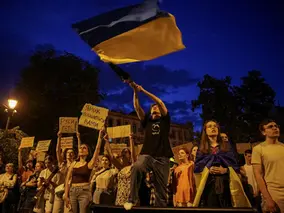

Bloodbath at the Border: Pakistan and Afghanistan Must Stop the Slaughter
In a brutal eruption of cross-border fury, Pakistani and Afghan forces turned the porous frontier into a killing field over the weekend,...


West Africa Bets on Circular Economy Amid Growing Waste Crisis
Representatives from the international human rights agency West Support also participated in the event. Western Africa Workshop on Waste Management and the Circular Economy


Libya at a Crossroads: UN Leadership, Russian Aggression, and the Search for Stability
The security situation in Libya has escalated following a Russian missile strike on the United Nations compound in Tripoli, highlighting...


Libya’s Fragile Calm and Washington’s New Experiment in Family Diplomacy
Tripoli — The last time an American warship pulled into a Libyan port, Lyndon Johnson was president. When the USS Mount Whitney made a...


Ukraine’s Democratic Crisis: Protests Erupt Over Zelensky’s Power Grab
KYIV, Ukraine — On the evening of July 22, 2025, Kyiv’s Maidan Nezalezhnosti, a symbol of Ukraine’s fight for freedom, once again pulsed...







Comments